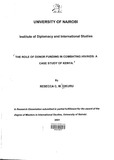The role of donor funding in combating HIV/AIDS: a case study of Kenya.

View/
Date
2001Author
Gikuru, Rebecca C. W
Type
ThesisLanguage
enMetadata
Show full item recordAbstract
This study investigates the role of donor funding in the fight against
HIV/ AIDS in Kenya. These was done with a view to prescribing policies
that would effectively control and curb the spread of HIV/AIDS, by
stopping new infections.
The study comprises of the introduction, the HIV/AIDS situation In
Kenya, Policy and Institutional framework, an assessment of
international aid agencies and NGOs, treatment and drug access,
empirical findings, summary, conclusion and recommendations. Data for the study was obtained through primary and secondary sources. The
study largely depended on available literature for secondary data. The
primary source of data was a survey carried out in Nairobi
The study reveals that one of the causes of the rise of new infections is
poverty. Another contentious issue hindering efforts to fight HIV/ AIDS is
culture, which is deeply entrenched, in most African communities. This
has made it very difficult for people to change their behaviour, which is
necessary in putting the pandemic under control.
One recommendation made in the study is for the stakeholders, led by
government of Kenya to demystify HIV/ AIDS for the people and thus help
break the people's belief systems. This requires the collaborative efforts
of the government, NGOs, who have grass root networks and
international aid agencies to provide the required funds.
On policy issues, it is recommended that the government re-visit and reevaluate
its policies on HIV/AIDS in order to tally them to the changing
realities. The study also recommends further academic research on
donor intervention in the HIV/ AIDS problem in Kenya.
Citation
Masters thesis University of Nairobi (2001)Publisher
University of Nairobi Institute of Diplomacy and International Studies
Description
degree of Masters in International Studies, University of Nairobi.
